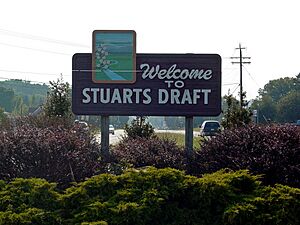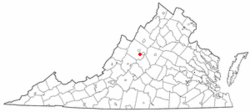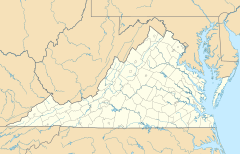Stuarts Draft, Virginia facts for kids
Quick facts for kids
Stuarts Draft
|
|
|---|---|
 |
|

Location in Virginia
|
|
| Country | United States |
| State | Virginia |
| County | Augusta |
| Founded | 1837 |
| Area | |
| • Total | 29.31 sq mi (75.9 km2) |
| Elevation | 1,421 ft (433 m) |
| Population
(2020)
|
|
| • Total | 12,142 |
| • Density | 165.4/sq mi (63.8/km2) |
| Time zone | UTC-5 (EST) |
| • Summer (DST) | UTC-4 (EDT) |
| ZIP code |
24477
|
| Area code(s) | 540 |
| FIPS code | 51-76272 |
| GNIS feature ID | 1500184 |
Stuarts Draft is a special kind of community called a census-designated place (CDP) in Augusta County, Virginia. It is located near the South River. In 2020, about 12,142 people lived there.
Stuarts Draft has a long history as a farming area, starting in the 1730s. Today, it's also a hub for factories and businesses. Big companies like Hershey, Hollister, and McKee Foods have plants here. You can often see large factories right next to fields where cattle are grazing!
Contents
History
Early Days and First Settlers
Before Europeans arrived, the Shawnee people lived in this area. Other tribes, the Delaware and Catawba, also visited often. When the first European settlers came to Augusta County in 1732, these tribes were at war. So, armed groups were a common sight.
In 1736, William Beverly received a large land grant from Virginia's Governor. He sold parts of this land to new settlers. One of these settlers was Archibald Stuart, who arrived in 1738. He helped start the Tinkling Spring Presbyterian Church in 1744. His land became known as the Pratt Farm. Other early families who bought land here included Alexander, Bell, Black, and Patton.
These early settlers built homes and cleared land for farming. They grew crops like hemp, corn, wheat, and flax. Hemp was a very important crop because it was used to make rope for ships. Robert Stuart even had a mill in Stuarts Draft.
How Stuarts Draft Got Its Name
In 1749, Thomas Stuart, Archibald's son, bought land near the South River. This land had a small valley or "draft," which is a local word for a cove. Thomas lived there with his wife and nine children.
There were some small battles in Augusta County between 1754 and 1794. When Thomas Stuart passed away, his land was sold. In 1800, John Harper bought the Stuart property.
Stuarts Draft did not have a post office until 1837. The first post office was in Thomas Stuart's old log cabin. This is why the name Stuarts Draft was chosen for the post office and the community.
Growth and the Railroad
In the 1850s, the Howardsville Turnpike was built through Stuarts Draft. This road allowed farmers to take their crops to Howardsville, a trading post on the James River. From there, goods could travel by boat to Richmond. This trip took about a week.
Stuarts Draft got its first doctor, James M. Watson, in 1856. He rode on horseback to see his patients. Many other families also moved to the area during this time.
During the Civil War, people in Stuarts Draft provided supplies and soldiers to the Confederate Army. The community's first school was a one-room schoolhouse. Later, a new school was built and expanded to five rooms as more students joined.
The post office moved back to town in 1881 when the Shenandoah Valley Railroad was being built. The railroad started stopping in Stuarts Draft in 1882, connecting the town to Roanoke and Hagerstown. This brought growth and wealth to the farming community. A commercial area grew up along the railroad tracks.
Many businesses opened near the railroad. Charles H. Cohron opened a store in 1885 and built the Stuarts Draft Mill in 1893. The railroad was bought by the Norfolk and Western Railway in 1891, which helped Stuarts Draft connect to even more places.
Modern Era and Industry
In 1895, George Samuel Etter opened his funeral home. Other businesses like a barrel factory and a chair factory also started. The first telephones in Stuarts Draft began working in 1897. By 1904, the post office served 1,200 people. Stuarts Draft School was the first in Augusta County to have a nine-month school year in 1906.
In 1907, the People's Bank opened. Dr. William Baldwin Dodge, a doctor for the railroad, also became a businessman. He opened the Dodge Inn for travelers and later developed Mountain Lake, now called Shenandoah Acres.
In the early 1900s, Stuarts Draft was known for its livestock and fruit farms. Farmers grew many apples, peaches, and pears. Stuarts Draft was a major apple producer, shipping hundreds of railroad car loads each year. Dr. Dodge was also a large grower of cranberries. Farmers raised cattle, hogs, sheep, and chickens.
In the 1940s, some Old Order Amish families moved to Stuarts Draft from Pennsylvania. In the 1960s, Stuarts Draft began its modern industrial age. Companies like Draftco and J. K. Porter (now NIBCO) opened plants. In the 1970s, Hollister, Ply-Gem Industries, and Rexnord also moved here.
Later, The Hershey Company opened a plant in 1980, and McKee Foods (makers of Little Debbie snacks) came in 1990. These factories brought many new jobs and people to Stuarts Draft. In 2017 and 2018, the community created a plan for future growth and development.
Geography
Location and Landscape
Stuarts Draft is located in the southeastern part of Augusta County. It sits on the northwest side of the Blue Ridge Mountains in the Shenandoah Valley. The area has a flat valley, or "draft," which is a local term for a cove. The soil here is very rich and good for farming.
Stuarts Draft is about eight miles south of Staunton and seven miles southwest of Waynesboro. In 2020, the area covered about 29.31 square miles (75.9 square kilometers). The area includes parts of the Christians Creek and South River watersheds. The South River flows into the South Fork of the Shenandoah River. Many smaller streams also flow through Stuarts Draft, such as Cole's Run and Folly Mills Creek.
Natural Areas
The George Washington National Forest borders Stuarts Draft to the south. This forest has many types of oak trees, as well as ash, beech, maple, and pine trees. You can find wildlife like black bears, deer, red foxes, and beavers here. The streams in the forest are home to native brook trout.
Stuarts Draft also has several natural and man-made ponds. Lake Wilda and Green Pond are natural ponds. The Maple Flats Ponds were built in the 1950s for migrating birds, but they are now used for fishing. These ponds have bass, bluegill, and catfish. There are also natural sinkhole ponds nearby, which have special plants.
Shenandoah Acres is next to the national forest and has a spring-fed lake. This area used to have a cranberry bog with rare plants and orchids. Sadly, the bog was destroyed to create Shenandoah Acres, and many of those rare plants disappeared from the area.
Stuarts Draft also has special areas set aside for farming and nature. The Cowbane Natural Area Preserve protects 147 acres (0.59 square kilometers) of unique marsh and prairie lands. These types of landscapes used to be common but have become rare due to farming and building.
Climate
Stuarts Draft has warm and humid summers. The winters are cold and can have snow. Temperatures usually range from 26°F to 86°F (about -3°C to 30°C). It rarely gets colder than 11°F (-12°C) or hotter than 93°F (34°C).
| Climate data for Stuarts Draft, Virginia | |||||||||||||
|---|---|---|---|---|---|---|---|---|---|---|---|---|---|
| Month | Jan | Feb | Mar | Apr | May | Jun | Jul | Aug | Sep | Oct | Nov | Dec | Year |
| Average high | 44 °F (7 °C) | 47 °F (8 °C) | 56 °F (13 °C) | 66 °F (19 °C) | 74 °F (23 °C) | 82 °F (28 °C) | 85 °F (29 °C) | 83 °F (28 °C) | 77 °F (25 °C) | 67 °F (19 °C) | 56 °F (13 °C) | 47 °F (8 °C) | |
| Daily mean | 34 °F (1 °C) | 37 °F (3 °C) | 45 °F (7 °C) | 55 °F (13 °C) | 63 °F (17 °C) | 72 °F (22 °C) | 75 °F (24 °C) | 73 °F (23 °C) | 67 °F (19 °C) | 56 °F (13 °C) | 46 °F (8 °C) | 37 °F (3 °C) | |
| Average low | 27 °F (−3 °C) | 28 °F (−2 °C) | 35 °F (2 °C) | 44 °F (7 °C) | 53 °F (12 °C) | 62 °F (17 °C) | 65 °F (18 °C) | 64 °F (18 °C) | 57 °F (14 °C) | 46 °F (8 °C) | 36 °F (2 °C) | 30 °F (−1 °C) | |
| Average precipitation | 2.3 in (58 mm) | 2.4 in (61 mm) | 2.8 in (71 mm) | 2.8 in (71 mm) | 3.5 in (89 mm) | 3.5 in (89 mm) | 3.2 in (81 mm) | 3.6 in (91 mm) | 3.2 in (81 mm) | 3.6 in (91 mm) | 2.8 in (71 mm) | 2.9 in (74 mm) | 36.7 in (930 mm) |
| Average snowfall | 5.9 in (150 mm) | 6.8 in (170 mm) | 2.8 in (71 mm) | 0.1 in (2.5 mm) | 0.0 in (0 mm) | 0.0 in (0 mm) | 0.0 in (0 mm) | 0.0 in (0 mm) | 0.0 in (0 mm) | 0.0 in (0 mm) | 1.0 in (25 mm) | 4.6 in (120 mm) | 21.2 in (540 mm) |
People and Economy
Population Facts
| Historical population | |||
|---|---|---|---|
| Census | Pop. | %± | |
| 1920 | 448 | — | |
| 1980 | 1,776 | — | |
| 1990 | 5,067 | 185.3% | |
| 2000 | 8,367 | 65.1% | |
| 2010 | 9,235 | 10.4% | |
| 2020 | 12,142 | 31.5% | |
| U.S. Decennial Census | |||
In 2020, Stuarts Draft had 12,142 residents. Most of the people (93%) are white. About 51.7% of the population is female and 48.3% is male. About 22.9% of the people are under 18 years old. Most adults (94%) have finished high school or higher education.
There are almost 5,000 households in Stuarts Draft. The average household has about 2.47 people.
Jobs and Businesses
The average household income in Stuarts Draft was about $63,679 in 2020. Most adults (63.6%) have jobs.
Farming is still important, but Stuarts Draft's biggest employers are its factories and distribution centers. These companies like Stuarts Draft because it's close to major highways and has a good workforce.
- Draftco Inc. is a machine shop that started in Stuarts Draft in 1965.
- NIBCO (formerly J. K. Porter) makes copper fittings and opened its plant in 1969.
- Hollister Incorporated makes medical devices and opened its facility in 1979.
- Ply-Gem Siding Group and Rexnord also moved here in the 1970s.
- The Hershey Company opened its second-largest U.S. chocolate factory in Stuarts Draft in 1980. It employs over 1,300 people.
- McKee Foods, which makes Little Debbie snack cakes, moved to the area in 1990 and has about 1,000 employees.
- The Target Mid-Atlantic Distribution Center is a huge building, one of the largest of its kind in the world.
- The Plant Company opened a large greenhouse in 2019 to grow houseplants.
| Rank | Business | Number of employees | Reference |
|---|---|---|---|
| 1 | Hershey Chocolate of Virginia | 1,300 and over | |
| 2 | Target Distribution Center | 1,000 and over | |
| 3 | McKee Foods Corporation | 500 to 999 | |
| 4 | Hollister | 500 to 999 | |
| 5 | NIBCO of Virginia | 250 to 499 | |
| 6 | McKee Foods Transportation | 100 to 249 | |
| 7 | Rexford Industries | 50 to 99 |
Arts and Culture
Local Events
Sweet Dreams is a fun, family-friendly festival held every summer at Stuarts Draft Park. It has been a tradition since about 2004.
Historic Buildings
Stuarts Draft has a historic shopping area along Draft Avenue, which used to be called Main Street. Some old buildings from the railroad era are still there, like the Kube Blacksmith Shop (built in 1928) and the Etter Funeral Home (built in 1895). The Shenvalee Farmhouse (built in 1890) is a beautiful Victorian-style house on Draft Avenue.
Two properties in Stuarts Draft are listed on the National Register of Historic Places, meaning they are important historical sites.
- The Bare House was built around 1857. It is a brick house with Greek Revival and Italianate styles. The ruins of its two-story stone mill, which operated from 1795 to 1850, are also on the property.
- The Harper House is another two-story brick house from the mid-1800s, also in the Italianate style. It includes other historic buildings like a meat house and a granary.
The Colter House, built around 1770, is another old brick house in Stuarts Draft. There is also a Craftsman style farmhouse from 1901 on Stuart Avenue.
Churches
Stuarts Draft is home to many churches, including:
- Calvary United Methodist Church
- Finley Memorial Presbyterian Church
- Greenmonte Mennonite Church
- Pilgrim Christian Fellowship
- Stuarts Draft Baptist Church
- White Hill Church of the Brethren
Sports and Recreation
Local Sports Teams
Stuarts Draft has a summer baseball league team called the Stuarts Draft Diamondbacks. They play at The Diamond Club. The Diamondbacks are part of the Rockingham County Baseball League and have won championships in 2012, 2013, 2014, and 2016.
Parks and Fun Places
- Kate Schneider Park has three lit baseball fields, one unlit field, a picnic area, and a large horseshoes court.
- Friendship Park has one lit baseball field.
- Stuarts Draft Park is a 13-acre (5.3-hectare) park that opened in 2004. It has a swimming pool, an amphitheater for shows, two baseball fields, picnic shelters, a playground, soccer fields, and a walking trail.
Shenandoah Acres was a very popular resort from 1935 to 2004. It was known as "America's Finest Inland Beach." It had campsites, cabins, horseback riding, tennis courts, and a sand-bottom swimming lake. Shenandoah Acres reopened in 2015 as Sun Retreats Shenandoah Valley. The new owners added more campsites and an arcade. It is now the largest recreation area near the George Washington National Forest.
The Stuarts Draft Library opened in October 2017 and is part of the Augusta County Library system.
Education
Stuarts Draft has several schools that are part of the Augusta County Schools system:
- Guy K. Stump Elementary School
- Stuarts Draft Elementary School
- Stuarts Draft Middle School
- Stuarts Draft High School
Some private schools in Stuarts Draft include Pilgrim Christian School and Ridgeview Christian School.
Infrastructure
Getting Around
Public Transportation
The Brite Bus offers public transportation in Stuarts Draft. It connects the community to nearby towns like Fishersville and Waynesboro, as well as to job and healthcare locations.
Main Roads
Major highways in Stuarts Draft include U.S. Route 340 (Stuarts Draft Highway). It is also close to major interstates like Interstate 81 and Interstate 64. Other important local roads include Cold Springs Road, Howardsville Turnpike, and Lyndhurst Road.
Services
- Water and Sewer: The Augusta County Service Authority provides public water and sewer services.
- Electricity: Dominion Energy and Shenandoah Valley Electric Cooperative provide electricity to the area.
- Safety: The Stuarts Draft Volunteer Fire Company and Stuarts Draft Rescue Squad help keep the community safe.
Notable People
Some well-known people from Stuarts Draft include:
- Shonn Bell, a professional football player
- John Colter, who was part of the famous Lewis and Clark Expedition
- George Harris, a professional wrestler
- James Patton, an early merchant and soldier
- Susan Swecker, who leads the Democratic Party of Virginia
- Brian Whitesell, a NASCAR team manager
- Kenneth R. Whitesell, a vice admiral in the United States Navy
Images for kids
See also
 In Spanish: Stuarts Draft (Virginia) para niños
In Spanish: Stuarts Draft (Virginia) para niños
 | Lonnie Johnson |
 | Granville Woods |
 | Lewis Howard Latimer |
 | James West |







